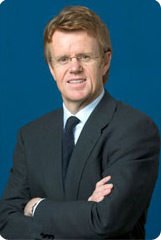Liberty: Ziggo is better fit than KBW
February 16, 2011
Nick Snow@Cable Congress
 Confirming CEO Mike Fries’ declaration yesterday that Liberty Global is on watch for acquisitions, Shane O’Neill, Chief Strategy Officer, took the opportunity of the Investor panel to confirm they were appraising KBW, but also that, given the choice and the right price, “Ziggo [the Dutch operator] is a much better fit for us.”
Confirming CEO Mike Fries’ declaration yesterday that Liberty Global is on watch for acquisitions, Shane O’Neill, Chief Strategy Officer, took the opportunity of the Investor panel to confirm they were appraising KBW, but also that, given the choice and the right price, “Ziggo [the Dutch operator] is a much better fit for us.”
Mixed news then for fellow panellist John Hahn of Providence Equity Partners. He said it was also well known that other investor groups and Kabel Deutschland were in the frame and that an IPO remained a live option. Marissa Drew, Co-Head of Global Market Solutions with Credit Suisse, predicted these ‘dual track’ exit strategies – encouraging trade interest while also pursuing a partial or complete IPO – would become more common as investors sought to achieve maximum value. Drew confirmed there was a great deal more market activity and appetite for IPOs this year and only further external events – like the Greece crisis in 2010 – would dampen it again.
O’Neill counselled caution, though, “multiples for cable are above eight for the first time in years, investors have to ask themselves if that is permanent – public markets have not traditionally been friends to cable, investors must ask ‘do I feel lucky this time?’” Of course, O’Neill would rather multiples remained low when Liberty are buying, and Hahn joked that if Liberty bought much more the Congress “could become a UPC off-site.”
O’Neill said valuations were pumped somewhat on the effect of a new “Internet bubble. When you criticise the valuations on the likes of Facebook and Twitter people look at you as though ‘you just don’t get it.’ I remember last time and I’m happy not to get it.”
While agreeing valuations were dizzying, Hahn commented, “at least this time the companies concerned do have revenue lines and they are growing very fast.”
As a competitive threat, O’Neill certainly takes Internet players very seriously; “as an industry we have to start matching their innovation and implementation cycle. We can’t think about four year STB swap outs, we’ve got to develop in six month windows and have the adaptability to do it. That’s why we’re so committed to the Horizon project.”
On whether regulators in Germany would allow the number of operators to fall, both Hahn and O’Neill agreed it was unpredictable, but their historical main concern of too much power for distributors over content providers has changed as the number of outlets for content exploitation has expanded.
